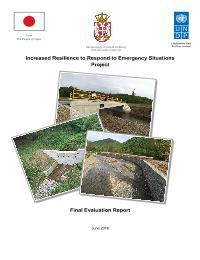
Increasing local-level resilience and preparedness to respond to disasters
The Government of Japan has supported municipalities in Serbia with the grant of US$ 3.64M dedicated to increasing local-level resilience and preparedness to respond to disasters.
The grant was implemented by UNDP through the Increased Resilience to Respond to Emergency Situations Project (the “Project”), focused on implementing key remediation measures and undertaking other activities in 41 municipalities in Serbia, with 27 municipalities specifically targeted.1 These municipalities were selected as the most affected municipalities based on the results of an assessment of the consequences of the devastating floods of May 2014. Combined, these municipalities are home to approximately 1.3 million inhabitants.
The Project supported recovery efforts and directly reduced communities’ vulnerability to future disasters; by doing so, the Project increased resilience in flood-affected municipalities through a series of targeted area-based, multi-dimensional and integrated interventions.
The initiative as proposed envisaged support to the Serbian municipalities most severely affected by the recent floods. The Project addressed infrastructure shortcomings that were identified in the aftermath of the floods while at the same time building resilience in communities and improving disaster risk management (“DRM”) and ensuring women’s inclusion in emergency response.
Activities of the Project were grouped within the following components:
- Small scale infrastructure works, which included reparation and improvement of the water supply system (including replacements of water pumps and the cleaning and reparation of water supply systems), wastewater treatment, improving sanitation at the municipal level (including unclogging drainage systems and conducting reconstruction work on sewage and collection systems), improving public utility infrastructure damaged during the floods, and supporting municipalities in developing technical project documentation for larger scale infrastructure investments (thus allowing municipalities better access to EU, multilateral and bilateral funding);
- Enhancing municipal capacities for disaster preparedness in line with the EU Civil Protection Mechanism;
- Supporting women NGOs in advocating for women’s participation in DRM and planning and in strengthening women’ security in crisis; and
- Landslide area rehabilitation.
The original Project duration was intended to be for 12 months, from March 2015 – February 2016. However, a one-month no-cost extension was requested by the Project and granted by the donor. The adjusted lifespan of the Project then was 13 months, with a date of completion of April 17, 2016.
Overall, the Project is evaluated as Highly Satisfactory.
Output 6.1. From the humanitarian phase after crisis, early economic revitalization generates jobs and other environmentally sustainable livelihoods opportunities for crisis affected men and women
1: Environment & Sustainable Development
2: Others


